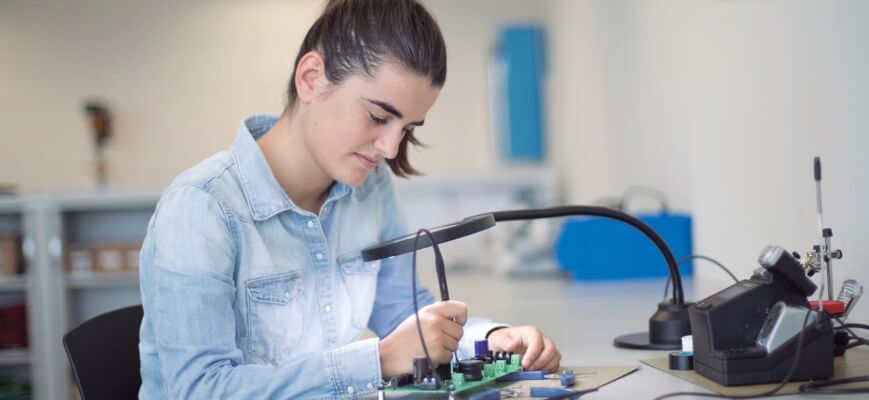Stays abroad and in-company End-of-Course Projects
Stays abroad and in-company End-of-Course Projects
Stays abroad and in-company End-of-Course Projects
Our fourth-year students have the opportunity to experience two unique experiences: On the one hand, they can conduct a stay abroad and, on the other hand, they can develop their final project in a company.

Our fourth-year students have the opportunity to experience two unique experiences: On the one hand, they can conduct a stay abroad and, on the other hand, they can develop their final project in a company. This is what they have to say about these experiences:
Pablo Elosegi –Full-year project at the Nagaoka University of Technology (Japan) - “The project has consisted of the development of a solar charger, which was then taken to the mountain... The Japanese are very quiet, and very similar to the stereotype we have of them in Europe. They are very polite and are always willing to help you.”
Cristina Rosado – Half-year stay in Germany - “One of the characteristics of the University is multiculturalism; there are students from multiple backgrounds studying here, and the people are very open. In addition, multiple activities are organised outside the University, so there is no time to become bored. Among the subjects, there is one called Interdisciplinary Project. In it, we are required to develop a project. Mine is called “Green FabLab”, and its objective is the design and implementation of a self-sufficient housing of 10 square metres. In total, we are 13 people, and my group works in the electrical part. We used a 3D printer to print several wind turbines and built two generators. The most interesting thing is that the group includes students from different disciplines and, as each one has different skills, many different ideas are generated.”
Lukas Irazusta – Half-year stay in Norway - “It is a very big campus. There are hundreds of students going from one place to another and organising multiple activities. There is a very important youth movement.
Unlike Mondragon University, we do not have multidisciplinary projects, but in some subjects, great importance is given to practical work. For example, in the subject “Design of a Wind Turbine”, we dedicated a month and a half to the design and assembly of the blades and generator of a wind turbine. Then, the wind generators of all groups are tested in a wind tunnel, as a competition. The one that achieved the highest efficiency won. Other Universities also participated in this competition. For example, this year a group from Berlin participated.
Pello Zubizarreta – TFG in Ikerlan - “I developed my end-of-course project at Ikerlan, addressing medium-power storage systems, with an emphasis on lithium-ion batteries. The objective of the project is to develop knowledge about the commercial technology of lithium-ion batteries.
It was a year-round project, divided into several tasks. First, I carried out an analysis of the lithium-ion battery market, analysing the different technologies, applications and products from different manufacturers. We then acquired a battery system that was interesting at the technological level, and I carried out an analysis and validation of its characteristics and features. In addition, I developed algorithms to estimate the state of charge (SOC) and state of health (SOH) of the lead batteries.
This project. In addition to providing me with important technical knowledge, it has helped me to know the ins and outs of the market and establish international business relationships. I also had the opportunity to witness first-hand the way a cooperative company acts.”
Aitor Garaizabal – TFG at Cetest – “The End-of-Course Project was one of the reasons why I came to Mondragon University. Being able to carry out a long-term project in a company gives you the confidence and security to be able to demonstrate what you are worth and everything you have learnt.
CETEST is a company that makes train trials. When they sent me the title of the project, I was a little scared (“Development of systems embedded in trains to predict electric arcs of pantograph-catenary interaction”). If there is one thing have learnt in Energy Engineering course, that is how to carry out projects. We value greatly this knowledge and these skills when we are in the real world and realise that we have more resources than other students for facing a project.
In short, I am required to develop a prototype that measures the arcs that are produced between the pantograph of the train (the mechanical arm at the top of the trains) and the overhead line (the cable to which trains are connected by the pantograph for power supply). This is what I am doing: programming with Matlab, diving into the world of optics and sensorisation, negotiating and buying products, and learning about legislation. The work environment is great. In general, there are many young people, which helps when it comes to integration in the group. The company is also interested, as I feel comfortable. For them, it is a great opportunity to prepare their future workers.”
